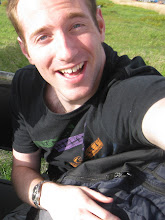My day started in Mrs. Shimizu's kitchen and ended at a haunted campsite. Do you have a few minutes? Let me tell you about it.
I woke up to big smiles, happy
good mornings, and a delicious Japanese-style breakfast. I ate, said goodbye to my
surrogate family, and they dropped me off beside a highway heading North.
I surveyed the area. Time for another hitchhikeability check.
A grin formed, and slowly widened as I scanned my location. I was in the hitchhikers' Mecca. The road was straight for miles, cars were frequent, and I was blessed with beautiful weather. The icing on the cake was to my left -- a large roadside service area and a parking lot filled with cars.
When you go to Mecca you expect a spiritual experience, and within mere seconds I got mine.
Like an athlete before a race, I closed my eyes and visualized the perfect execution. A car slowed and stopped beside me. The window slowly came down, and in a low, sultry voice a beautiful woman--
"Excuse me! Do you need a ride?"
His name was Tsubasa. He was not even female, never mind the swimsuit model who'd inhabited my visualization -- but, as they say, hitchers can't be choosers.
He was a young LED salesman on a business trip, headed to a meeting where he was about to make the biggest sale of his career. Five hundred grand. A sure thing, he called it.
"Wow, congratulations," I said. "What's the commission like on that kind of--"
"That's not my dream, you know," he interjected.
He explained that all his life he'd longed to own a convenience store. Not a chain of stores -- just one. He'd spend his days in front of a wall of cigarettes, looking out from behind a chewing gum-lined counter -- making the lives of locals a little more ... convenient.
It's important to have dreams in life, and 76km later I wished him the best of luck as he drove off to his meeting.
If Tsubasa was interesting, the next guy I met was even more so. A mother and son stopped in their minivan where I joined -- cool! -- another hitchhiker, Tatsu.
It was fitting that I was still close to Mecca, because he reminded me of a Japanese Jesus. Forgive the blasphemy here, but the similarities were striking. He'd been traveling alone for months. He was very thin, with weeks of facial hair. He was living off just $3 per day, making rice balls in the morning for his meals. He was wise, too, imparting lots of good hitchhiking advice.
The driver showed great kindness, taking us to her home, where Jesus took a much needed bath. We had some snacks, and Jesus amazed us all by turning water into green tea.
We walked to the highway together, and I started to say goodbye when he stopped me.
"Will you write a message for me?" he asked.
I agreed, and he took out his tent, all sides of which were covered with messages from people he'd met in his travels. He called them his friends, but we both knew they were disciples. I took his marker and wrote a note. I affixed a Canada pin to it and wished him a happy Canada day. It was July 1st!
He walked off into the distance. Jesus had left me, and this is where my story gets darker, my dear readers.
"I sell tombstones," said my next driver. He squinted at me through curls of cigarette smoke. He didn't say much else, but he brought me to the vicinity of a campsite I was looking for, and not the graveyard I'd been half expecting. I thanked him for not making me a client, and I think he muttered something about death.
It was a lonely 20-minute hike to the campsite, and as I got closer the air thickened with fog. The place was deserted. It might as well have been a graveyard; not even birds lived here. I walked slowly to a large wooden building with boarded windows. The only sound was the soft hum of vending machines, which cast an eerie glow into the mist.
Day quickly gave way to night, and I pitched my tent as rain began to fall and a cold breeze picked up. Was Hokkaido always this cold in July?
I took these pictures of the haunted campsite. See the light coming from the second floor window? That's the ghost of a girl who died of hypothermia many winters ago. The light is a fire she makes each night to keep warm.


I shivered in the cold, damp air inside my tent as I recorded the day's events in my journal. I wrote quickly. The sooner I got to sleep, the sooner I could leave this bone-chilling campground. I should never have left Jesus.









